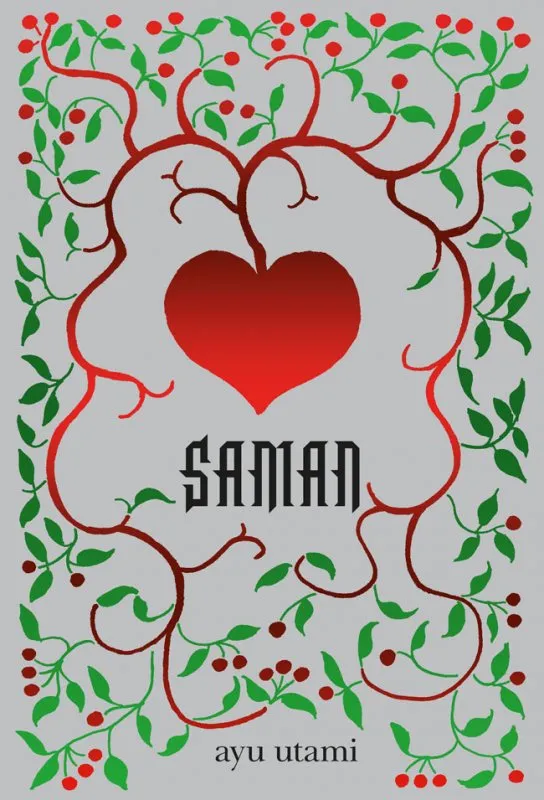Saman

Author: Ayu Utami
Category: Fiction, literature
Language: Indonesia
Publication Year: 1998
Pages: 216
Description:
"Saman" by Ayu Utami is a groundbreaking novel in Indonesian literature, offering a bold and unapologetic exploration of themes such as politics, sexuality, and the struggle for social justice. Published in 1998, right around the time of the Indonesian reform era, "Saman" became a literary sensation, not just for its provocative content but also for its fresh narrative style and the way it broke away from the traditional norms of Indonesian storytelling.
The novel is primarily centered around Saman, a Catholic priest turned social activist, who becomes involved in defending the rights of oppressed plantation workers in South Sumatra. His transformation from a religious figure into a rebellious advocate for justice is at the heart of the novel, providing a compelling narrative that delves into the complexities of moral choices and the cost of fighting for what is right.
But Saman is just one thread in this intricate tapestry. The story is also told from the perspectives of four women—Laila, Yasmin, Shakuntala, and Cokorda—each offering a unique viewpoint that adds depth to the narrative. Through these characters, Utami explores themes of love, desire, and the constraints placed upon women in a conservative society. The women's stories are intertwined with Saman’s, creating a rich, multifaceted plot that captures the reader's attention.
What makes "Saman" particularly compelling is how Ayu Utami tackles taboo subjects head-on. She dives into discussions of sexual freedom and female desire with a frankness that was almost unheard of in Indonesian literature at the time. Her portrayal of women as sexual beings with their own desires and agency was a bold move, challenging the patriarchal norms and conservative values of Indonesian society. This candidness about sexuality, combined with Utami's poetic and evocative prose, creates a narrative that is both raw and lyrical.
The novel also offers a scathing critique of the political and social climate of Indonesia during the 1990s. Through Saman's story, Utami exposes the corruption, human rights abuses, and exploitation faced by the marginalized in Indonesian society. The struggles of the plantation workers that Saman becomes involved with serve as a powerful backdrop to the personal and emotional journeys of the characters. The intertwining of personal narratives with broader socio-political issues is where "Saman" truly shines, making it more than just a personal story but a reflection on the broader struggles within society.
Ayu Utami’s narrative style in "Saman" is non-linear and shifts between different perspectives and timelines. This can be a bit disorienting at first, but it serves to create a mosaic-like structure that mirrors the complexity of the issues being addressed. The prose is richly descriptive, with vivid imagery that brings the settings and characters to life. Utami has a talent for creating moments of intense emotional resonance, whether she’s describing the lush landscapes of Sumatra or the inner turmoil of her characters.
"Saman" isn't just a novel you read; it’s a novel you experience. It challenges the reader to confront uncomfortable truths about society, power, and the human condition. It’s filled with moments of beauty and brutality, love and loss, idealism and disillusionment. The characters are flawed and deeply human, each grappling with their own dilemmas in a world that often seems indifferent to their struggles.
While "Saman" is steeped in the context of Indonesian culture and politics, its themes are universal. It speaks to the universal human desire for freedom—be it political, social, or personal—and the courage it takes to pursue it. It's a novel that asks tough questions about faith, morality, and the cost of standing up against injustice.
In sum, "Saman" by Ayu Utami is a daring and evocative work that broke new ground in Indonesian literature. It’s a novel that’s unafraid to push boundaries, both in terms of content and style. Through its exploration of complex themes and its vivid, multi-dimensional characters, it offers a powerful commentary on the nature of freedom and the human spirit’s resilience in the face of oppression. If you're looking for a novel that is both intellectually stimulating and emotionally gripping, "Saman" is a must-read.
Personal Notes:
For me personally, this book brought a refreshing change to the Indonesian literary scene, which was then dominated by male authors. "Saman" is a must-read for the younger generation to broaden their understanding of Indonesia's dark history.
Back to Home